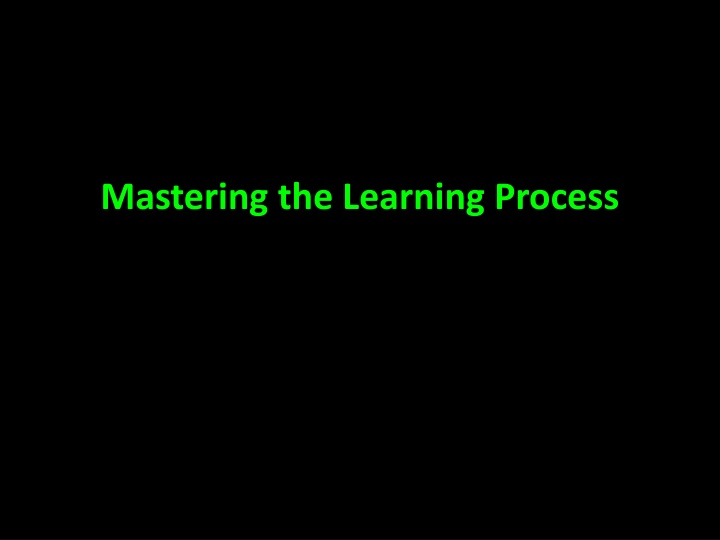
Effective Learning Strategies
Enhance your studying and learning efficiency by delving into the science of memory, contextual clues for recall, spaced studying, testing methods, and effective reviewing techniques. Avoid common pitfalls to optimize your learning experience.
Download Presentation

Please find below an Image/Link to download the presentation.
The content on the website is provided AS IS for your information and personal use only. It may not be sold, licensed, or shared on other websites without obtaining consent from the author. If you encounter any issues during the download, it is possible that the publisher has removed the file from their server.
You are allowed to download the files provided on this website for personal or commercial use, subject to the condition that they are used lawfully. All files are the property of their respective owners.
The content on the website is provided AS IS for your information and personal use only. It may not be sold, licensed, or shared on other websites without obtaining consent from the author.
E N D
Presentation Transcript
How Memory Works To increase the effectiveness of your studying and learning, you must understand the science behind memory.
Understanding How We Learn Contextual Clues for Memory Recall Your brain is constantly taking in what is around you Using triggers Don t create rituals for studying; Challenge your brain to recall information
Understanding How We Learn Space Studying Out Space out studying in shorter chunks, and repeat this over time for the largest return on investment You re not spending any more time. You re not working any harder. But you remember for longer. Mary Roach The farther you are from a test, have longer study intervals. The closer you are to a test, have shorter intervals. Pomodoro Method Week 1: Initial learning Chapters 1-2 Week 3: Test Week 5 Review Ch. 1-4; Initial learning Ch. 5-6 Review SAME material at least 2 more times in week 3 Review SAME material at least 1 more time in week 1 Review SAME material at least 1 more time in week 2 Review SAME material at least 3 more times in week 4 Week 2: Review Chapter 1-2 Add Initial Learning Chapter 3-4 Week 4: Review Ch 1-6
Understanding How We Learn Testing As Part of Studying Testing means practicing the concepts without any study aids Testing yourself earlier in your study routine will also confirm for you what you don t know, and allow you time to review this material. When you study, then test yourself, you are more likely to remember the material later. How can you test yourself?
Understanding How We Learn When Reviewing Material The more multi-sensory techniques you use to learn information over time, the more neuro pathways you build. Examples of multi-sensory techniques: Visual Cornell Note-Taking Doodling Verbal/Explanation Teaching Others Study Groups Associations Efficient Repetition Organization Mnemonic Tricks Take a break! A syn-nap
Understanding How We Learn Things to Avoid Re-writing the same thing over and over Simple memorization and regurgitation Cramming Sticking with the flash cards model. Moving on when you don t understand something Going to class without a clue as to what will be covered Not going to class
Time/Priority Management The key is not to prioritize what s on your schedule, but to schedule your priorities. Stephen Covey This is really more about managing all of your priorities to accomplish your goal. You must be intentional with your time, study habits, and what you are prioritizing. You don t have to be a student 100% of your day! But you do need to plan so you can accomplish everything that s important to you.
Time/Priority Management Let s start with the BIG PICTURE Backwards Planning (see handout) Plan now for the super stressful weeks. What can you do not to mitigate the impact of those weeks? The more you do now to plan your future weeks and semester, the more likely you will be able to handle things when you are very stressed.
Time/Priority Management Set Milestones and Goals Goal Mapping (handout) At each milestone, reflect and re-assess your habits
Time/Priority Management After you do backwards planning and set your goals, you will need to incorporate strategic decision making and planning on a daily and weekly basis There are many ways to do this. At a minimum, you will need a basic organization tool that you use daily and week. This could be: Planner (hard copy) Calendar on your wall White board Post-it notes Simple notebook to plan your day(s) Electronic calendar or app To-Do List Personal Kanban Priority Grid Other methods what do you use?
Get Started Your task is to complete the following by next class: Backwards Planning for the Semester Set at least one milestone that occurs before the end of the semester and complete goal mapping for at least one goal. Pick a time/organization method and use it daily/weekly (planners, Kanban, Priority grid, etc) Pick a study technique and use it daily/weekly (spaced intervals, Cornell method, teaching, Pomodoro, etc)
Online Resources: Learning Doodling for Learning Ted Talk: http://www.ted.com/talks/sunni_brown Article: http://content.time.com/time/health/article/0,8599,1882127,00.html Cornell Method for Notetaking: http://goo.gl/WDMuni Studying, General Article Teach as part of the learning process: http://goo.gl/LuviDu Article based on the How We Learn book: http://ww2.kqed.org/mindshift/2014/08/25/how-does-the-brain- learn-best-smart-studying-strategies/ Online tools for better attention and focus: http://99u.com/articles/6969/10-online-tools-for-better-attention-focus http://collegeinfogeek.com/resources/ Time/Priority Management Building Your Own Productivity Style: http://lifehacker.com/5828033/how-to-build-your-own-productivity-style-by- remixing-from-the-best Pomorodo Method: http://pomodorotechnique.com/ http://lifehacker.com/productivity-101-a-primer-to-the-pomodoro-technique-1598992730 http://www.moosti.com/ Personal Kanban: http://goo.gl/vjuE9V http://yeswekanban.net/ Getting Things Done Philosophy http://lifehacker.com/productivity-101-a-primer-to-the-getting-things-done-1551880955 Mastering Your To Do List: http://lifehacker.com/5986867/david-allen-explains-how-to-master-your-to-do-list Prioritizing Article: How To Prioritize When Everything Is Important: http://lifehacker.com/5877111/how-to-prioritize-when- everything-is-important Priority Grid: http://www.usgs.gov/humancapital/documents/TimeManagementGrid.pdf Motivation Ted Talk: http://www.ted.com/talks/dan_pink_on_motivation?language=en
